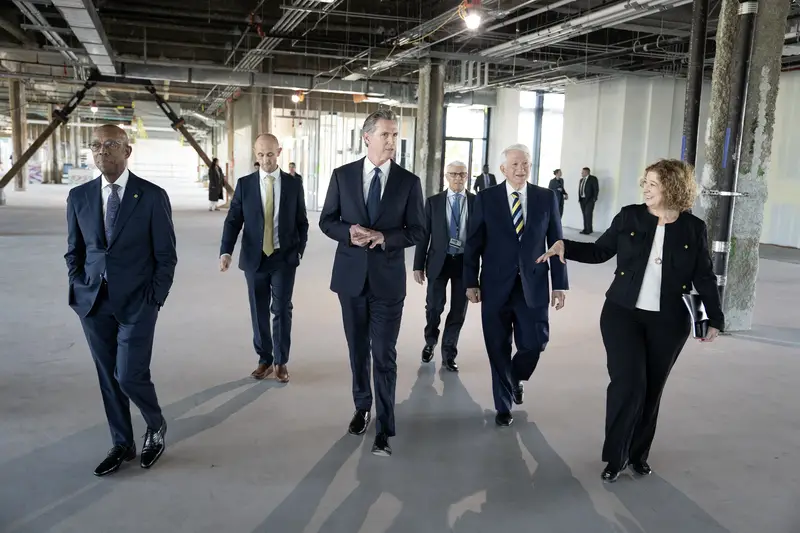Insider Brief
- The UCLA Center for Quantum Science and Engineering will be one interdisciplinary research centers housed at UCLA Research Park.
- The state acquired the former Westside Pavilion shopping mall in Los Angeles for the project.
- Representatives said the center will bring together academics and industry partners from around the world to lead scientific and technology projects that will benefit California, the United States and the world.
PRESS RELEASE — Governor Gavin Newsom, joined by University of California (UC) President Michael Drake, UCLA Chancellor Gene Block, representatives of Google, elected officials, and academic, business, and health care leaders announced the state has acquired the former Westside Pavilion shopping mall in Los Angeles. The site — which UCLA will transform into the UCLA Research Park — will bring together academics and industry partners from around the world to lead scientific and technology projects that will benefit California, the United States, and the world.
Governor Newsom said: “California is the epicenter of global innovation — from the creation of the internet to the dominance of artificial intelligence, humanity’s future happens here first. Leveraging the next waves of technology and science — quantum computing and the immense potential of immunology — the UCLA Research Park will cement California’s global economic, scientific, and technological dominance into the 22nd century, and beyond.”
The 700,000-square-foot property will initially host two multidisciplinary research centers: the California Institute for Immunology and Immunotherapy at UCLA and the Center for Quantum Science and Engineering.

“This purchase exemplifies the remarkable collaboration between the University of California, the State of California, and our partners in the private sector,” said UC President Michael Drake. “We’re grateful to Governor Newsom and the Legislature for their continued support. Investments like this help ensure that the University can continue to thrive and serve people across California.”
“This acquisition will be absolutely transformative for UCLA, our great city and the world. Governor Newsom and the California Legislature helped make this possible through a generous state investment, and we are deeply thankful for their support,” said UCLA Chancellor Gene Block. “We will remake the empty former mall into a state-of-the-art hub of research and innovation that will bring scholars from different higher education institutions, corporate partners, government agencies, and startups together to explore new areas of inquiry and achieve breakthroughs that will serve our global society.”
The new UCLA Research Park is made possible in part by a prior state investment to establish and fund the immunology and immunotherapy institute at UCLA. The institute is also supported by a group of founding donors from the biotechnology, academic, entrepreneurship, and philanthropic communities.
Harnessing the power of public-private partnerships, and working with key partners — including Google, Hudson Pacific Properties, and Macerich — the state is saving approximately $223 million on the research park and opening years ahead of schedule.
Google, which previously leased part of the property, helped enable and support UCLA’s acquisition.
“We’re delighted that UCLA will be further developing this state-of-the-art facility to help accelerate transformative research and innovation,” said Scott Foster, Google’s vice president of real estate and workplace services. “Google has called the Greater Los Angeles Area home for over 20 years, and we saw an opportunity for the space to be better utilized in a way that benefits the broader community.”
The UCLA Research Park will be home to the California Institute for Immunology and Immunotherapy. The Institute will draw on the expertise of UCLA faculty members, scholars from different higher education institutions, and other leading scientists and practitioners in clinical and biomedical scientific research, including human genetics, genomics, computer science, engineering, and information science.
Researchers will pursue new tools, treatments, and vaccines that could help cure cancer, autoimmune and immune deficiency disorders, infectious diseases, allergies, heart conditions, solid organ transplantation, and other major health-related issues.
The UCLA Research Park will also be home to the UCLA Center for Quantum Science and Engineering, which conducts research in the emerging field of quantum science and technology — including quantum computing, communication and sensing — to dramatically increase information processing power by harnessing the unusual behavior of subatomic particles.
Quantum computing has the potential to solve equations in mere minutes that would traditionally take existing computers tens of thousands of years to complete — enabling immense potential to enhance medication discovery, improve artificial intelligence tools, combat climate change, and model complex scenarios.
California is the world leader in science and technology. The state is investing billions in research and development efforts and in career pathways initiatives to create good-paying jobs — with and without a college degree. The 5th-largest economy in the world, the Golden State is the #1 state for manufacturing, technology, new business starts, and access to venture capital. The University of California is the top research institution in the world for U.S. patent generation and the state is home to more engineers, more scientists, more researchers, and more Nobel laureates than anywhere else in the nation.
If you found this article to be informative, you can explore more current quantum news here, exclusives, interviews, and podcasts.















